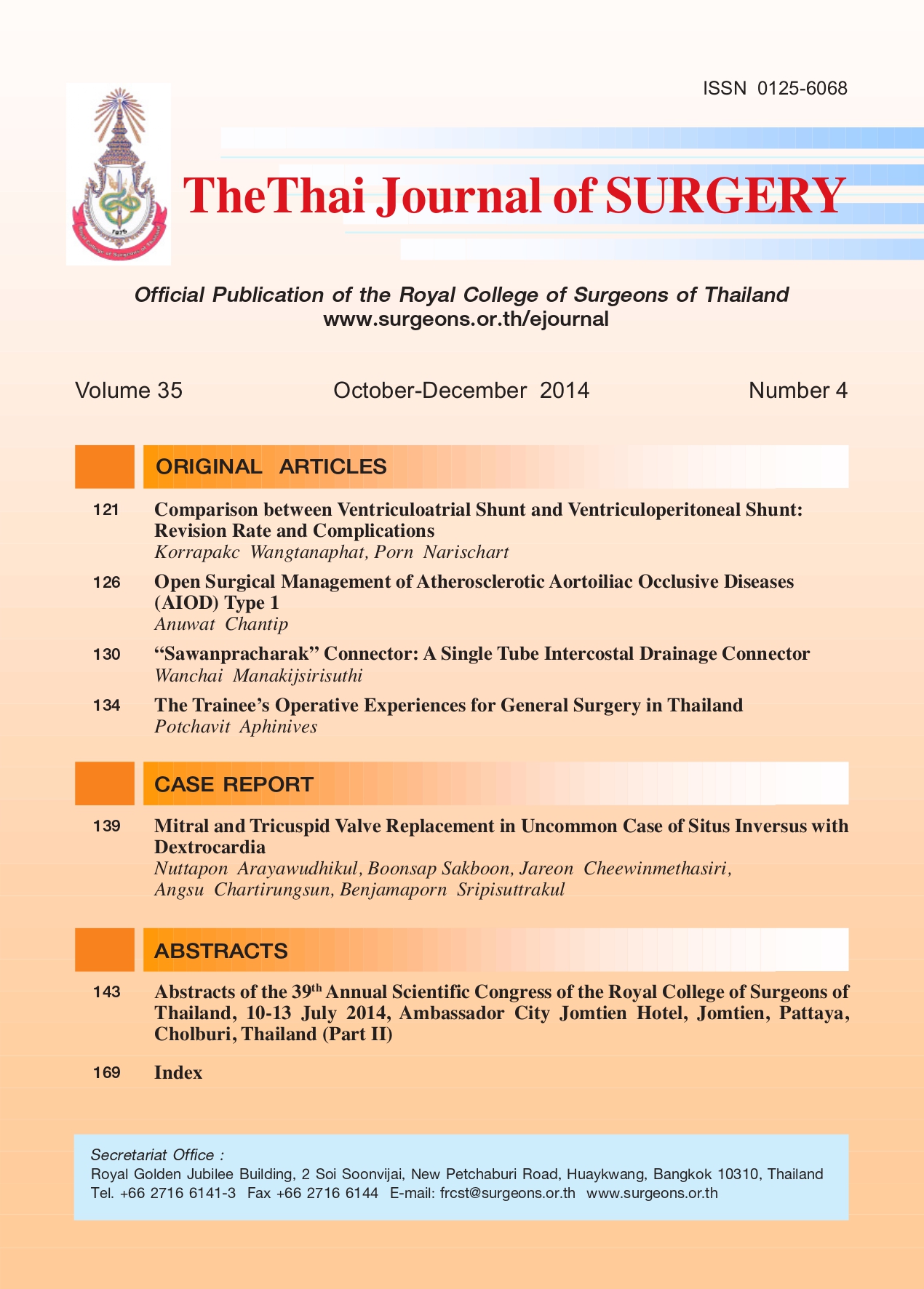The Trainee’s Operative Experiences for General Surgery in Thailand
Keywords:
Electronic logbook, electronic operative record, essential procedure, resident’s operative experience, trainee’s operative experienceAbstract
Background: In Thailand, each trainee in general surgery is requested to have experiences of 100 majoroperative procedures as an operator and 400 operative procedures as an assistant during 4 years. Many major
procedures were recommended in the course syllabus, but some trainees seemed to select easier cases to operate,
resulting in insufficient experiences as a general surgeon.
Materials & Methods: An electronic logbook program was implemented since the academic year 2006. In this
study, only the data of trainees who started their training from the academic years 2008 and 2009 were analyzed, because
they had just finished their training in the academic years 2011 and 2012.
Results: The electronic operative records of 162 trainees were analyzed. By average, each trainee operated 257
procedures as a chief operator (100 required), and assisted 482 procedures (400 required) during 4-year training. As
an operator, the first procedure was appendectomy, followed by inguinal hernia operation, and upper GI endoscopy.
As an assistant, the first procedure was laparoscopic cholecystectomy, followed by median sternotomy and inguinal
hernia operation. Among 15 essential procedure groups, the average number of performance per trainee was over the
minimal requirement for almost all procedures, except thyroidectomy and liver surgery.
Conclusion: The electronic logbook operative records program allowed a more accurate and easier analysis of
the trainees’ operative experiences than the written logbook system. All trainees had operative experiences more than
the eligibility criteria.
References
of general surgery in Thailand. J Med Assoc Thai 2013;96:47-
51.
2. Lonergan PE, Mulsow J, Tanner WA, Traynor O, Tierney S.
Analysing the operative experience of basic surgical trainees
in Ireland using a web-based logbook. BMC Med Educ 2011;
11:70-7.
3. Wallace CJ, Stansfield D, Ellis KAG, Clemmer TP.
Implementation of an electronic logbook for intensive care
units. AMIA 2002;840-4.
4. Satogata T, Campbell I, Marr G, Sampson P. Operations
electronic logbook experience at BNL. EPAC 2002.
5. Dunnington G. Uneven operative experience in surgical
training: a call for action. Ann Surg 2009;249:725-6.
6. Sher JL, Reed MR, Calvert P, Wallace WA, Lamb A. Influencing
the national training agenda. The UK & Ireland orthopaedic
eLogbook. J Bone Joint Surg Br 2005;87:1182-6.
7. Veldenz HC, Dennis JW, Dovgan PS. Quality control of resident
operative experience compliance with RRC criteria. J Surg
Res 2001;98:81-4.
8. Crofts TJ, Griffiths JM, Sharma S, Wygrala J, Aitken RJ. Surgical
training: an objective assessment of recent changes for a
single health board. BMJ 1997;314:891-5.
9. Bell RH Jr, Biester TW, Tabuenca A, Rhodes RS, Cofer JB, Britt LD,
Lewis FR Jr. Operative experience of residents in US general
surgery programs: a gap between expectation and
experience. Ann Surg 2009;249(5):719-24.
10. Kairys JC, McGuire K, Crawford AG, Yeo CJ. Cumulative
operative experience is decreasing during general surgery
residency: a worrisome trend for surgical trainees? J Am Coll
Surg 2008;206:804-11.
11. Jarman BT, Miller MR, Brown RS, Armen SB, Bozaan AG, Ho GT,
Hartranft TH. The 80-hour work week: will we have lessexperienced
graduating surgeons? Curr Surg 2004;61:612-5.
12. Chikwe J, de Souza AC, Pepper JR. No time to train the
surgeons. BMJ 2004;328:418-9.
Downloads
Published
How to Cite
Issue
Section
License
Articles must be contributed solely to The Thai Journal of Surgery and when published become the property of the Royal College of Surgeons of Thailand. The Royal College of Surgeons of Thailand reserves copyright on all published materials and such materials may not be reproduced in any form without the written permission.



